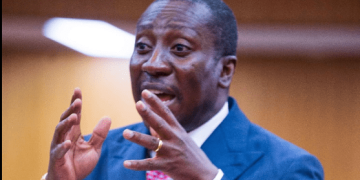On Tuesday night, Parliament passed the Energy Sector Levy (Amendment) Bill 2025, triggering a fresh wave of public outrage, public neglect and deepening concerns over the rising cost of living.
At the heart of the controversy is the introduction of a crippling GH¢1 charge per litre of petrol and diesel—an indirect tax that will reverberate across transport fares, food prices, and general inflation.
The government’s rationale is predictable: plugging financial shortfalls in the energy sector and servicing legacy debts. But the means to that end—a regressive levy on fuel—will disproportionately affect the ordinary Ghanaian, already crushed under the weight of escalating utility tariffs, stagnant wages, and the broader economic slump.
What makes this move more politically jarring, however, is the National Democratic Congress (NDC)’s vociferous condemnation of the now-notorious Electronic Transfer Levy (E-Levy) in 2022, which it subsequently repealed.
Back then, the NDC positioned itself as the voice of the struggling masses, decrying the E-Levy as “insensitive”, “punitive”, and “morally bankrupt.” They launched nationwide campaigns and pledged to repeal the levy when given the opportunity.
Fast forward to 2025, and that same NDC caucus in Parliament now lends its weight—either through tacit consent or passive acquiescence—to a fuel levy that threatens to exact an even harsher toll on livelihoods.
The GH¢1 charge per litre is, by economic logic, potentially more harmful than the E-Levy: fuel drives nearly every aspect of the economy, from food distribution to public transport and industrial operations. The cumulative inflationary effect will ripple far wider than that of digital transactions.
This raises troubling questions about political consistency and sincerity. Has the NDC shifted its principles for political expediency? And are Ghanaians now caught in a vicious cycle where taxation, rather than innovation and fiscal discipline, becomes the default policy response?
The Minority had plenty to say describing the levy as insensitive and refused to participate in the deliberation and staged a walk out in protest.
The hypocrisy is hard to ignore. At a time when citizens are yearning for relief and economic leadership, Parliament—across both sides of the aisle—appears tone-deaf and complicit in deepening the financial strain on households. The easy route of taxation cannot be a substitute for bold reforms, transparent energy sector governance, and real efforts to plug leakages and corruption.
Ghana deserves better. The Energy Sector Levy (Amendment) is not just a tax; it is a test of political integrity. Unfortunately, Parliament has failed that test—and the people will pay the price.



















































































